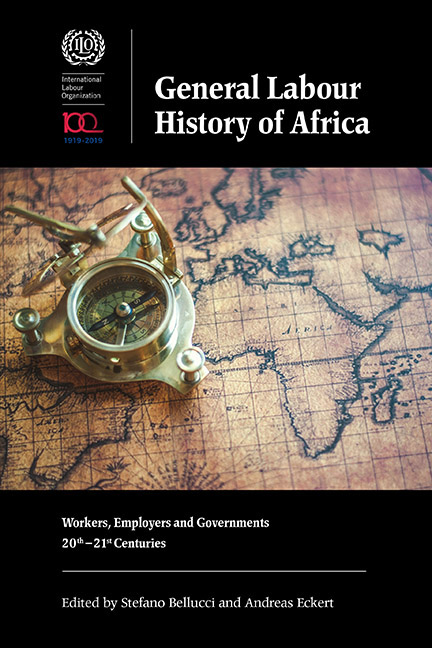Book contents
- Frontmatter
- Contents
- List of Maps and Figures
- List of Tables
- Notes on Contributors
- Foreword
- Acknowledgements
- The ‘Labour Question’ in Africanist Historiography
- Part I Free and Unfree Labour
- Part II Key Sectors
- Part III International Dimensions and Mobility
- Part IV Varieties of Work
- 10 Domestic Work
- 11 Military and Police
- 12 Crime and Illegal Work
- 13 White-Collar Workers
- 14 Sport, Tourism and Entertainment
- Part V Entrepreneurs and Self-Employment
- Part VI The State, Unions and Welfare
- Part VII Conclusions
- Select Bibliography
- Index
10 - Domestic Work
from Part IV - Varieties of Work
Published online by Cambridge University Press: 21 September 2019
- Frontmatter
- Contents
- List of Maps and Figures
- List of Tables
- Notes on Contributors
- Foreword
- Acknowledgements
- The ‘Labour Question’ in Africanist Historiography
- Part I Free and Unfree Labour
- Part II Key Sectors
- Part III International Dimensions and Mobility
- Part IV Varieties of Work
- 10 Domestic Work
- 11 Military and Police
- 12 Crime and Illegal Work
- 13 White-Collar Workers
- 14 Sport, Tourism and Entertainment
- Part V Entrepreneurs and Self-Employment
- Part VI The State, Unions and Welfare
- Part VII Conclusions
- Select Bibliography
- Index
Summary
Throughout African history, domestic labour time, directed at meeting the basic consumption needs of family members, has dwarfed any other labour time allocation. Yet it has received scant historical documentation because of its diffuse, home-based nature and the repetitive work of daily basic need provisioning – all readily observable in the here and now but defying analytical attention over time and space.
Domestic labour, commonly termed ‘housework’, is conventionally conflated with ‘women's work’. Housework encompasses childcare, cooking, washing, cleaning and general household maintenance. It is perceived as a jumble of multitasking activity dominating women's daily lives, motivated by love, duty, care and concern for family and lineage rather than monetary gain. This chapter attempts to piece together a historical narrative of the changing nature of domestic labour since 1900 based on social science literature.
Rural African women, notably the millions engaged in hoe production of staple food crops, were responsible for a triple workload of agricultural production, household drudgery and childcare responsibilities. Pro-natalist norms, in conformity with agrarian labour needs, ordained frequent childbearing. A voluminous literature on African rural women and work was informed by an earlier theoretical debate about domestic labour centred on the unequal gender division of household labour and the devalorization of women's work within the home. These themes struck a chord with Western donor agencies’ efforts to ameliorate poverty and power asymmetries in the African countryside. The World Employment Programme of the International Labour Organization commissioned a number of rural labour studies during the 1980s, amassing evidence of women's domestic labour patterns.
The following section traces domestic labour's evolution with respect to domestic labour performance, the household division of labour, and how unmonetized, family-based domestic labour is affected by the general expansion of labour commodification in African economies through time. The next section establishes the analytical context, drawing attention to productive and reproductive spheres encompassing housework, rural subsistence agriculture and urban production patterns, as well as childcare demands. African domestic labour's evolution is periodized as follows: the colonial period, 1900–49; the nationalist and early postcolonial period, 1950–79; economic crisis, de-agrarianization and income diversification, 1980–99; and the neoliberal economic boom, urbanization and sectoral realignment towards natural resource extraction in African national economies from 2000 to the present.
- Type
- Chapter
- Information
- General Labour History of AfricaWorkers, Employers and Governments, 20th-21st Centuries, pp. 301 - 332Publisher: Boydell & BrewerPrint publication year: 2019



